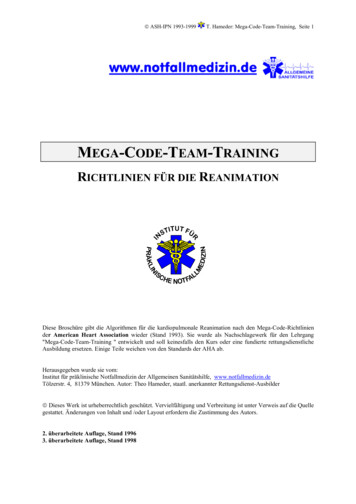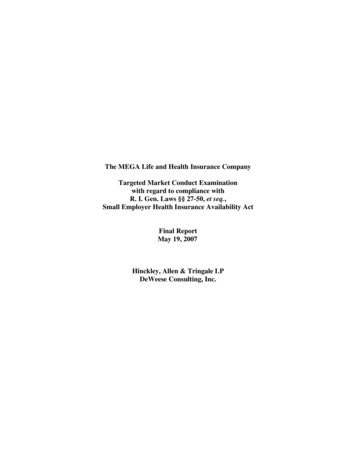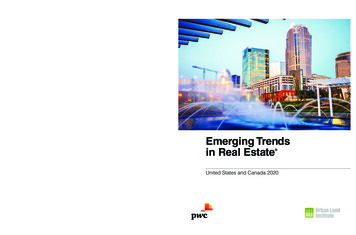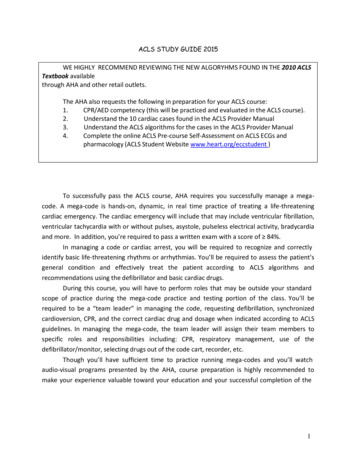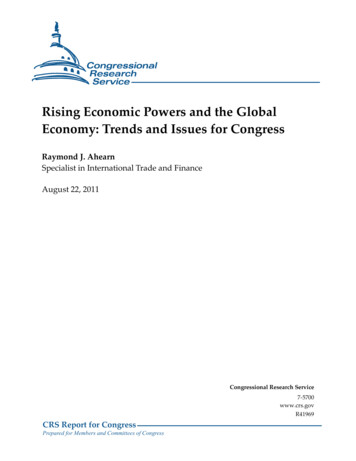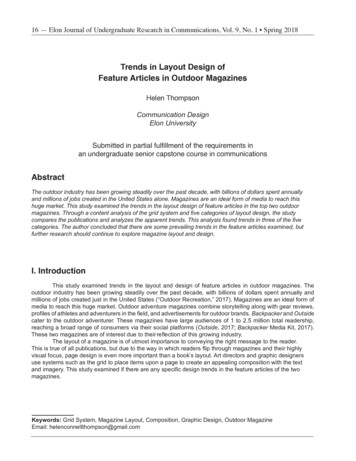
Transcription
10 Mega Trends that are(re)shaping our worldSimon Atkinson
1Mega trends that are (re) shaping the world
1. DynamicPopulations
The Global populationcontinues to grow1976201620504,136,5427,431,2099,725,148
Powered by high birthrates in some countriesNigerMaliBurundiSomaliaUgandaBurkina FasoZambiaMalawiIndiaUAESouth AfricaFranceTurkeyUnited StatesUnited ,81,61,61,61,41,4
Big Changes Ahead. Estimated population from 2010 to 2050 in U.S. and Nigeria500 MILLION440 Million Nigeria383400401 Million 02050
But the global population is getting olderMedian age (years), Estimates for 2010 and 2050464140413740373229252719AsiaAfricaLatin America2010North America2050EuropeOceania
In 1950, life expectancy in Chinawas 40 years.By 2050, this will haverisen to 80 years.
2. GrowingOpportunity andGrowing Inequality
Global population andglobal middle class population2009202020306.8 billion1.8 billion7.7 billion3.2 billion8.3 billion4.9 billion
By 2030, 66% of theworld’s middle classeswill be living in Asia
.which should beno surprise to anyone!There are more peopleliving inside this circlethan outside of it
GrowingOpportunity?Young indevelopingcountries areoptimistic% of under 30swho expect lifeto be betterChinaBrazilTurkeyIndiaJapanRussiaS AfricaTotalArgentinaSwedenAustraliaGermanyPolandS %
7686World9798Central &Eastern Europe98 100Central Asia8295East Asia &the PacificObjective (nearly) achieved?Adult Literacy rates 1990-20158693Latin America& the Caribbean5579Arab States5366Sub-SaharanAfrica4770South &West Asia
50%Internet usage: the pointwhere the web starts tohave a real impact oneconomic development
60%of the globalpopulationhas no internetaccess
Internet Users 000Non-Users (internetless)
GrowingInequality?It worries us% agreeHaving largedifferences inincome andwealth is badfor societyoverallChinaSpainTurkeyGermanyRussiaS aGBArgentinaS 7%77%74%73%72%68%68%67%67%64%64%63%60%47%
3. Megacities
341960441993542014662050% of the World’s population living in urban areas
The urban population isincreasing by.50,000 a day
1.5 milliona month(a city the size of Prague)
18 milliona year(the populationof Chile)
AfricaWill graduallyreplace Asia asthe region withhighest urbangrowth rate
AfricaLagos 21 millionCairo 15 millionKinshasa 9 million
City LivingA choice ratherthan a necessity?
Want to live in cities?IndiaChinaSouth KoreaPolandSouth adaUSFranceAustraliaGBArgentinaJapanBelgiumHave to live in cities?
Tokyo 26.6New York 15.9Mexico City 10.7Osaka-Kobe 9.8Sao Paulo 9.6Los Angeles 8.9Buenos Aires 8.7Calcutta 7.9Rio de Janeiro 7.6Moscow 6.61975Tokyo21.9 Mumbai21.6 Mexico City20.5 Sao Paulo19.9 New York18.6 Delhi17.2 Shanghai17.0 Calcutta16.8 Jakarta16.8 Dhaka35.52015
4. Increasingconnectedness anddecreasing privacy
CinemaDigital/terrestrialTVIn one eTVMicrobloggingViralvideoRadio
60%of the globalpopulationhas no internetaccess
83%of global internetusers say accessto the web shouldbe a “basichuman right”
% agreeI worry thatcompanies canaccess my postson socialnetworking sitesfor informationabout goods andservices I aS AfricaBelgiumChinaTotalCanadaS 3%62%59%56%51%47%
And is it changingour behaviour?78%“The level ofinterrupt, thesort ofoverwhelmingrapidity ofinformation is in factaffectingcognition”In China say theyare ‘constantlylooking atscreens thesedays’Eric Schmidt - Google‘Facebook Homecould changeour brains’Susan Greenfield Neuroscientist
And is it changingour behaviour?79%“The level ofinterrupt, thesort ofoverwhelmingrapidity ofinformation is in factaffectingcognition”Of Chineseunder 30s feel“restless oruneasy” if theydon’t look attheir phone foran hourEric Schmidt - Google‘Facebook Homecould changeour brains’Susan Greenfield Neuroscientist
5. Healthierand sicker
Global life expectancyis rising 2015908580AfricaAsia7570Europe65Latin America and theCaribbean6055Northern America504519752100
But there is stillwork to do
91% now have access toimproved drinking water
2,000 child deathsfrom diarrhoea in 2000 1,000 today
1 in 3Millennium TARGET MISSED700,000,000 peopleof the World’s populationdo not have access toadequate sanitation facilities
Uncertainty #1Can our healthcaresystems cope?
Uncertainty #1Can ourhealthcaresystems cope?% goodHow would you ratethe quality ofhealthcare that youand your family haveaccess to in ?BelgiumGBUSAustraliaSwedenFranceS rkeyS 8%57%53%50%50%47%43%35%34%26%19%10%9%
Uncertainty #2Our ownlifestyle choices
Most of the world'spopulation now lives incountries where beingoverweight or obesekills more people thanbeing underweight
Turkey: we think 32% of us“are overweight or obese”
Turkey 32% 65%are overweight or obese
Uncertainty #3Climate change
Uncertainty #3Climate changeGlobally, 70%agree there’s solidevidence the Earthis getting warmer
Uncertainty #3Climate change% agreeWe are heading forenvironmental disasterunless we change ourhabits quicklyChinaItalyArgentinaTurkeyS AfricaIndiaBrazilS 5%75%73%73%71%70%67%65%60%59%59%59%
6. Rise of individualchoice and fracturing ofthe mass market
Where was Apple40 years ago ?20161976
But big brandsare not alwaysAmericanBrand FinanceGlobal 500# home country ofeach outh lySwedenIndia185493332312819141411109888886
The mass market:what we are usedto is changing
The mass market:what we are usedto is changingExample #1:Motoring
The mass market:what we are usedto is changingExample #2:BusinessPresentations
A slide seen in business strategy presentations around the world.
A slide seen in business strategy presentations around the world.
7. Rise of the individualand decline ofsocial cohesion
The “traditional”family structuresare changing
No of marriages per 1,000 population (OECD Countries)8197052015
Single personhouseholds are thefastest-growinghousehold profile inthe period to 2030
Single-person Households: the fastest growinghousehold profile in the period to 20302427 283111119AsiaMiddleEast ericaWesternEurope
Cause foroptimism?societies are notbreaking down
“Crime against theperson and againstproperty is falling inmost rich countries”The Economist
But crime is RISINGin developing markets% changein differenttypes of crime, 20032013! 50%!-50%LowerincomecountriesDrug possessionDrug mecountries!!!BurglaryVehicle theft!Robbery!!Rape!!
8. Culturalconvergence andincreasing extremes
1.4b588mChineseHindi-Urdu527m276mEnglishArabicMost native speakers389mSpanish
Culturalconvergence
Case Study:Those whose jobsinvolve interactionswith othercountries
Languagesspoken withcolleagues fromother %2%1%1%1%1%1%1%1%1%1%1%
Case Study:Spending ourfree time atthe movies
English language continues to dominate1975 & 2015Jaws1.Star Wars 7The Rocky Horror Picture Show2.Jurassic WorldOne Flew Over the Cuckoo's Nest3.Furious 7The Wilderness Family4.The Avengers: age of UltronRollerball5.MinionsLucky Lady6.SpectreRooster Cogburn . and the Lady7.Inside OutThe Streetfighter8.Mission: Impossible – Rogue NationAt Long Last Love9.The Hunger Games: Mockingjay – Part 2Monty Python and the Holy Grail10.The Martian
Culturaldiversity:Is religion unitingor dividing theWorld?
Most people inthe world todayidentify with areligionIndiaTurkeyS lAustraliaGermanyBelgiumSpainS 82%80%74%71%67%62%61%61%58%57%55%53%53%52%
Globally:65% agreePeople have morethings in commonthan things that makethem different
Turkey:81% agreePeople have morethings in commonthan things that makethem different
Globally:77% agreeWe live in anincreasinglydangerous world
Turkey:89% agreeWe live in anincreasinglydangerous world
Globally:56% agreeThere are too manyimmigrants
Turkey:79% agreeThere are too manyimmigrants
9. Always on versusoff the grid
% agreeI feel under a lotof pressure to besuccessful andmake moneyS AfricaRussiaIndiaTurkeyS %
% agreeIt is moreimportant tohave a goodwork-lifebalance than tohave a nyGBSwedenAustraliaTotalTurkeyS AfricaArgentinaUSPolandIndiaS 0%80%78%77%77%77%75%75%75%74%71%
1/5global employeesnow work remotely,at least some ofthe time
In OECD countries, people are starting to work fewer hours1,8451,77020002014Hours worked per year
65%want to work for anorganisation“with a powerfulsocial conscience”
“More or less all business started out with a socialpurpose of some kind What’s been lost in recent decades is theinterconnectivity between the needs of societyand the innovative dynamism of business So the future may look more like a rediscovery ofthis social purpose of business”Paul Bakus, President of Corporate Affairs, Nestle
?Maybe we willhave more freetime on our handsthan we expect.
10. Emergence ofpublic opinion asrevolutionary force
Widespreaddissatisfactionwith how weare governed% dissatisfiedThe way thegovernment isrunning the countryItalyS keyBrazilIndiaS 3%41%
“The rapid growth of the precariat isproducing instabilities in society.It is a dangerous class because it isinternally divided, leading to thevillainisation of migrants and othervulnerable groups.And its members may besusceptible to the siren calls ofpolitical extremism”
1Mega trends that are (re) shaping the world
Ageingpeople?The leftbehind?Necessitynot choice?Changing ourbehaviour?New illnesses,tired planet?Will we enjoythe ride?How safe willwe feel?Moretension?Work-lifebalance?Where arewe heading?
Thank you@SimonMAtkinsonsimon.atkinson@ipsos.com
% of the World’s population living in urban areas 1960 1993 2014 2050 34 44 54 66 . 50,000 a day The urban population is increasing by. 1.5 million a month (a city the size of Prague) 18 million a year (the population of Chile) Africa Will gradually replace Asia as the region with highest
